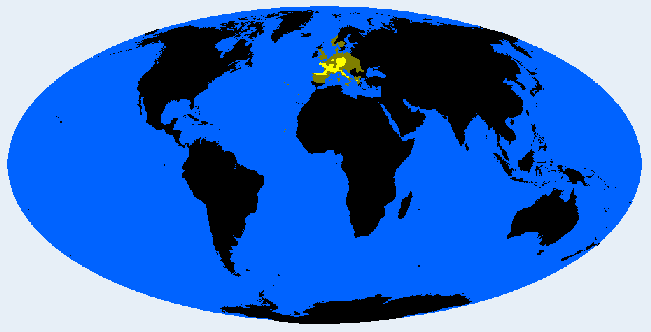Description
Alpinid proper, historically found in the mountain regions of Western Europe. Often a cohabitant of a second mountain type, the Dinarid. The nucleus of Alpinids lies in the Western Alps and Central France (e.g. the Swiss Disentis, the French Savoy, Auvergne and Massif Central regions). Common in Southern Germany as well (e.g. Franconia, Black Forest), the Apennines of Italy, Northern Spain, and Belgium.
Physical Traits
Height: Short to medium
Build: Endomorph
Skull: (Hyper-)brachycephalic
Face: Wide and round
Nose: Leptorrhine, short, small
Skin: Fair to light brown
Hair color: Light brown, blonde minority
Hair texture: Straight to wavy
Fair to light brown skin, straight or wavy, usually (light) brown hair with a blonde minority. Rather short to medium height, mesoskelic, endomorph. (Hyper-)brachycephalic, chamae-orthocranic. Face wide and round with a great interorbital distance and soft features. Leptorrhine, short, small, sometimes concave nose. Female snub noses common. Forehead steep and round. Body hair not very strong.
Literature References
Originally called Keltoid (c.p. Broca, 1868). Renamed to Alpinid by Gros and Lapouge (1897) and Ripley (1900). This was adopted by Deniker (1900), Coon (1939), Eickstedt (1952), Biasutti (1967), Knussmann (1996). Some included Gorid/Strandid. Lundman separated the western low-skulls as Cevennid / (West) Alpinid.
- Broca (1868) - Originally called Keltoid
- Gros and Lapouge (1897) - Renamed to Alpinid
- Ripley (1900) - Adopted Alpinid terminology
- Deniker (1900) - Classification adoption
- Coon (1939) - Alpinid description
- Lundman (1943, 1988) - Separated western low-skulls as Cevennid / West Alpinid
- Eickstedt (1952) - Alpine classification
- Biasutti (1967) - Alpinid documentation
- Knussmann (1996) - Modern classification








